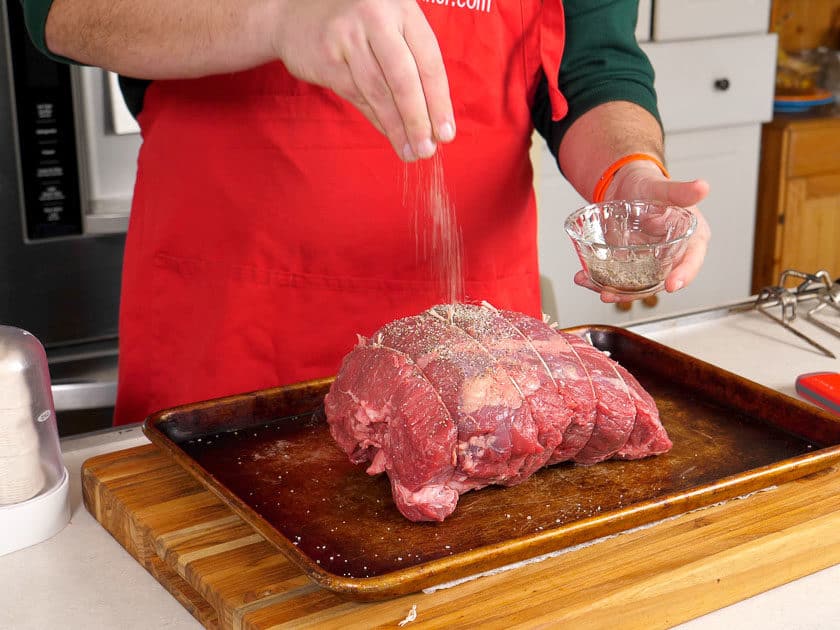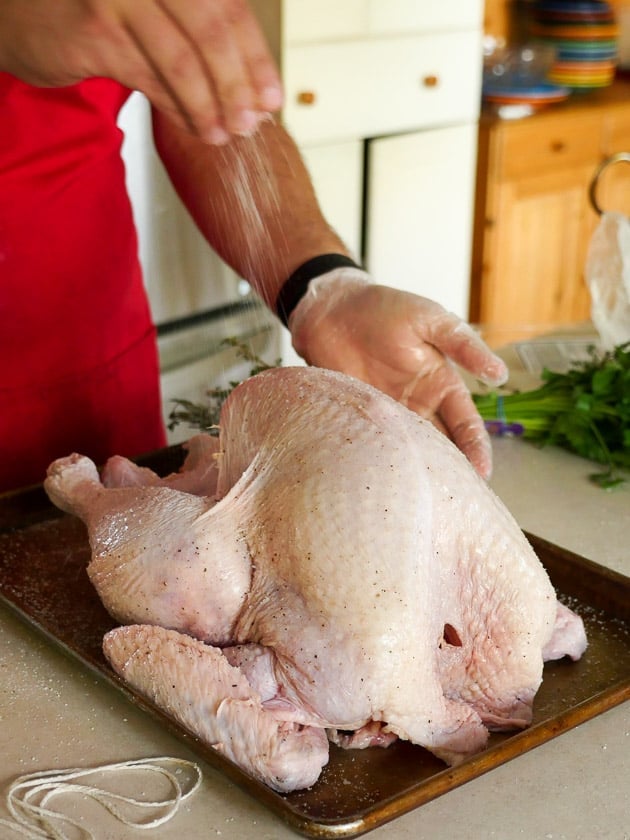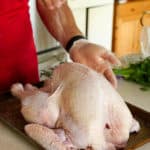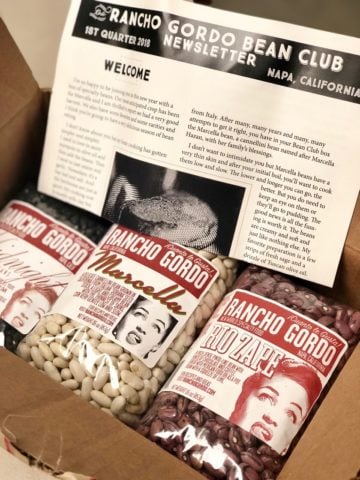
My highly opinionated guide to dry brining your food
I got a lot of questions around Thanksgiving about dry brining…and again around Christmas. I’m answering the most common questions here in a Dry Brining FAQ, so I can refer to this post when I'm asked next time.
Opening Statement: This is supposed to be simple
Think of dry brining as “salting early.” I’m not loading up on extra salt; I’m using the same amount I would to season the roast right before cooking. Also, it’s a forgiving technique; I only sweat the details because I’m writing recipes. When I’m cooking Sunday roast chicken, I take a much more casual approach. I buy the birds on Saturday, sprinkle them with salt until they look well seasoned, then stash them in the refrigerator for the next day’s dinner.
Dry brining is born from trying to extend the shelf life of food in the good old days. Sprinkling with salt kills some of the spoilage bacteria on the surface of the meat, so it takes longer to go bad. Before refrigeration, the extra seasoning was just a bonus.
(This is not a silver bullet - don’t leave a roast in the refrigerator for weeks, thinking “I salted it, so it’s good.”)
Also, if you’re worried about dry brining - especially if you’re worried about dry brining - don’t try it for the first time on your Thanksgiving dinner. Do a test run with a roast chicken for Sunday dinner. It’s easy, tastes great, and if you hate it, you’re only out a few bucks, not the centerpiece of the biggest meal of the year.
Is dry brined meat going to be salty?
No, we’re just salting early. I use the same amount of salt than I would if I was seasoning the meat right before cooking. The salt works its way into the meat, seasoning the roast more thoroughly.
Note: People are different. (No!) Some people are naturally sensitive to salt, and some have been warned by medical professionals to avoid salt. I’ve never had a complaint about my dry brined food being “too salty,” but if you know you are sensitive to salt, you should skip it.
Why do you use kosher salt for dry brining?
I dry brine with kosher salt because it is easier to sprinkle. The large, flaky grains are easy to pinch and shower evenly over the meat. And, because of those large, airy flakes, kosher salt is less salty. Table salt has twice the actual sodium of kosher salt if you measure by volume, because table salt is much denser. In other words, the amount of kosher salt in my recipes may look high, but it’s half of what it seems if you’re used to table salt.

Should I rinse the meat after dry brining?
No! Please, no. Two reasons:
- The dry brine won’t be too salty. If it is, you should cut back on the salt in your dry brine, not rinse the food. Because…
- You should not rinse meat. It is a kitchen sanitation disaster. Rinsing means splashing meat juices all over. The sink, the counter, the sponge next to the sink, the rack of dishes drying next to the sink... (Yes, I know grandma rinsed her chicken before cooking it. It’s still a bad idea.)
- OK, third reason - rinsing makes it harder for the meat to brown. Wet meat doesn’t brown well. Yes, you can pat the meat dry with paper towels when you’re done rinsing, but…see #1 and #2 again.
Minimum dry brining time?
My answer to this question is “At least 1 hour before cooking, 4 hours is better, and at least 8 hours is best.” Thanks to Kenji Alt’s research over at Serious Eats, we know that it takes about 40 minutes for the salt to start to work as a dry brine. Before that it is just pulling juices out of the meat - If you're that close to cooking, wait, and salt right before starting. Because it’s a nice round number, I go with an hour before cooking as my minimum dry brining time.
…OK, I’ll confess. The rules above are what I follow for beef. For chicken, turkey, and pork, my rule is different: my minimum dry brining time is the night before cooking. I will use a wet brine if today is the day I want to cook the meat. A 4 to 8 hour wet brine seasons the meat much more thoroughly. I prefer dry brining to wet brining in general…but for poultry and pork, the results are pretty close with a wet brine, and I’d rather get the deep seasoning. (I don’t wet brine beef. I don’t like the taste.)
Maximum dry brining time?
The longest I’ll go is about 3 days ahead of time. For example, I always pick up my Thanksgiving turkey on Monday, dry brine it, and pop it into the fridge until Thursday.
(I know some people swear by dry aging beef for a week or longer in their home refrigerator - but that’s a bridge too far for me, and a completely separate topic.)
Should I dry brine covered or uncovered in the refrigerator?
Uncovered for 36 hours or less. The refrigerator acts as a dehumidifier, and that’s a good thing - a roast with a dry surface browns better than a roast without one. I’ll let it go for a day plus overnight without covering the roast. (…and maybe two days if I’m lazy…)
When I dry brine for longer than 36 hours, I cover the roast with plastic wrap, and then unwrap it for the last 24 hours before cooking. I don’t want it to dry out too much in the refrigerator.
Should I put the dry brining meat on a rack?
I like to use a rack, to keep the air flowing and the meat from sitting in its juices…but I’m not militant about it. If I’m in a hurry, I’ll dry brine a couple of chickens and just leave them on a rimmed sheet pan overnight. For celebration meals, like a Thanksgiving turkey or Christmas roast, I break out the rack…and live with the annoying cleanup afterward.
Do I have to dry brine in the refrigerator?
Yes! Well, mostly. If you’re dry brining for an hour or two, you can leave the meat out on the counter. Any longer and it really should go in the refrigerator.
Can I use the pan drippings?
I’ve heard some people say their pan drippings are too salty to use. I wonder if they’re using store-bought chicken broth to deglaze the pan. Store-bought broth, even “low sodium” broth, has a lot of salt in it. (A lot.) I use homemade broth, and I have never had it come out "too salty." If you're worried, don't season your gravy until after you've stirred in the pan drippings - then you can taste and add more salt as needed.
Should I dry brine poultry under or on the skin?
I dry brine directly on the breast meat, by carefully working my hand under the skin and lifting it away from the meat, then rubbing the brine directly on the breast meat. But again, I’m not militant about it. If you can get it on there without tearing the skin, it helps the salt penetrate deeper. But, if you’re not comfortable working your hand under the skin, or you’re just in a hurry, sprinkle the bird inside and out. My experience is the salt penetrates through the skin and into the meat - especially since the only skin I try to remove is on the breast. I season the rest of the bird on the skin, and season inside the cavity as well, so the salt penetrates from both directions.
If you do dry brine on the skin, do it at least the day before, to give the salt time to work its way to the meat. I dry brine overnight at a minimum and prefer 24 to 48 hours.
What do you think?
Any other dry brining questions? Leave them in the comments section below, and I’ll try to answer them.
References and Sources:
Judy Rodgers - Zuni Cafe Cookbook
Russ Parsons - Dry Brined Turkey (a.k.a. the “Judy Bird”) - LA Times
Alton Brown - Good Eats
Kenji Alt - The Food Lab - SeriousEats.com
Cooks Illustrated Magazine
Related Posts
Cast Iron Roasted Butterflied Chicken
Rotisserie Turkey Dry Brined with Orange and Spices
Rotisserie Beef Prime Rib Roast
Enjoyed this post? Want to help out DadCooksDinner? Subscribe to DadCooksDinner via eMail and share this post with your friends. Want to contribute directly? Donate to my Tip Jar, or buy something from Amazon.com through the links on this site. Thank you.






David says
If I'm using a dry rub with salt on baby backs, does the rub constitute a dry brine, or do I need to dry brine separately?
Mike Vrobel says
I use the dry rub with salt to do the dry brine.
Ron Batleman says
When dry brining a prime rib roast in the refrigerator for 24 hours, should it be plastic wrapped, loosely wrapped or left uncovered?
Mike Vrobel says
Uncovered
Mike Vrobel says
I don’t use either - I don’t butter my turkey.
Jillian says
How much kosher salt per pound of turkey? Sorry if I missed that.
Mike Vrobel says
¼ cup (1.5oz) Diamond Crystal Kosher salt for a 12 to 14 pound turkey:
https://www.dadcooksdinner.com/grilled-turkey-dry-brined-grilling-basics/
½ cup (3oz) Diamond Crystal Kosher salt for a 20 to 24 pound turkey:
https://www.dadcooksdinner.com/rotisserie-turkey-wrapped-with-bacon/
Chuck S. says
Hello, great article. My question is this-can I use too much salt on the skin of a chicken?
Mike Vrobel says
Yes, but this isn’t too much.
Maurits says
Hi Mike, thanks for this post, I'm about to try dry brining for the first time. Quick question: does it make any difference if the fridge is no-frost or not? Thanks!
Mike Vrobel says
No, it does not make a difference.
Susan Traylor says
I just dry brined my turkey for the first night with foil covering it loosely and there is water in the pan beneath the rack. Is this normal? I thought that the turkey was fully defrosted, but maybe it wasn't. Should I empty the water out now?
Mike Vrobel says
I would leave it unless the pan is threatening to overflow.
Phil says
Hey, Mike!
What’s your position on poking holes in poultry before roasting it? I just followed a recipe that called for taking a toothpick or something similar and poking all over the chicken right after rubbing in the dry brine, and right before placing in the fridge the night before roasting it.
Thanks!
Phil
Mike Vrobel says
I would not bother - dry brining works great without the extra effort of poking.
Teresa says
A friend recommended dry brining a kosher turkey that has already been wet brined. It sounds like too much salt. What are your thoughts on this.
Mike Vrobel says
I buy Kosher turkeys when I don’t have time to brine, so I would not dry brine it.
joel says
Sorry for coming late to the party.
Thanks for an informative and helpful article.
What is your opinion on dry brining a fresh cut beef roast, letting it cure for 24 hours and then freezing it ?
thanks
Mike Vrobel says
I don't think that's a good idea - the salt starts to break down the cell walls, and freezing will make that worse. It will result in mushy meat.
VTgriller says
I am dry brining a Prime Rib. Can you add a rub to this after the brine or should I just leave the dry brined rib alone? I have a horseradish crust that I wanted ot put on the rib after the brine.
Mike Vrobel says
Save the rub for right before grilling - I think horseradish will not improve in the refrigerator.
David N. says
Another great blog post! For Christmas dinner this year, I dry brined three beautiful porterhouse steaks for about 24 hours and then sous vide them. The steaks had a depth of flavor I don't ever recall having from my own kitchen before. I'm definitely sold on the technique!
I do have a question about rinsing the meat. While I don't ever rinse any other meat before cooking, I have also rinsed my turkeys after removing them from their packaging. Are you saying you don't rinse your turkeys either?
Thanks.
Mike Vrobel says
That's right - I don't rinse any of my meat. If there is a lot of juice in the packaging, I might pat it dry with paper towels, but I don't recall that happening with a turkey.